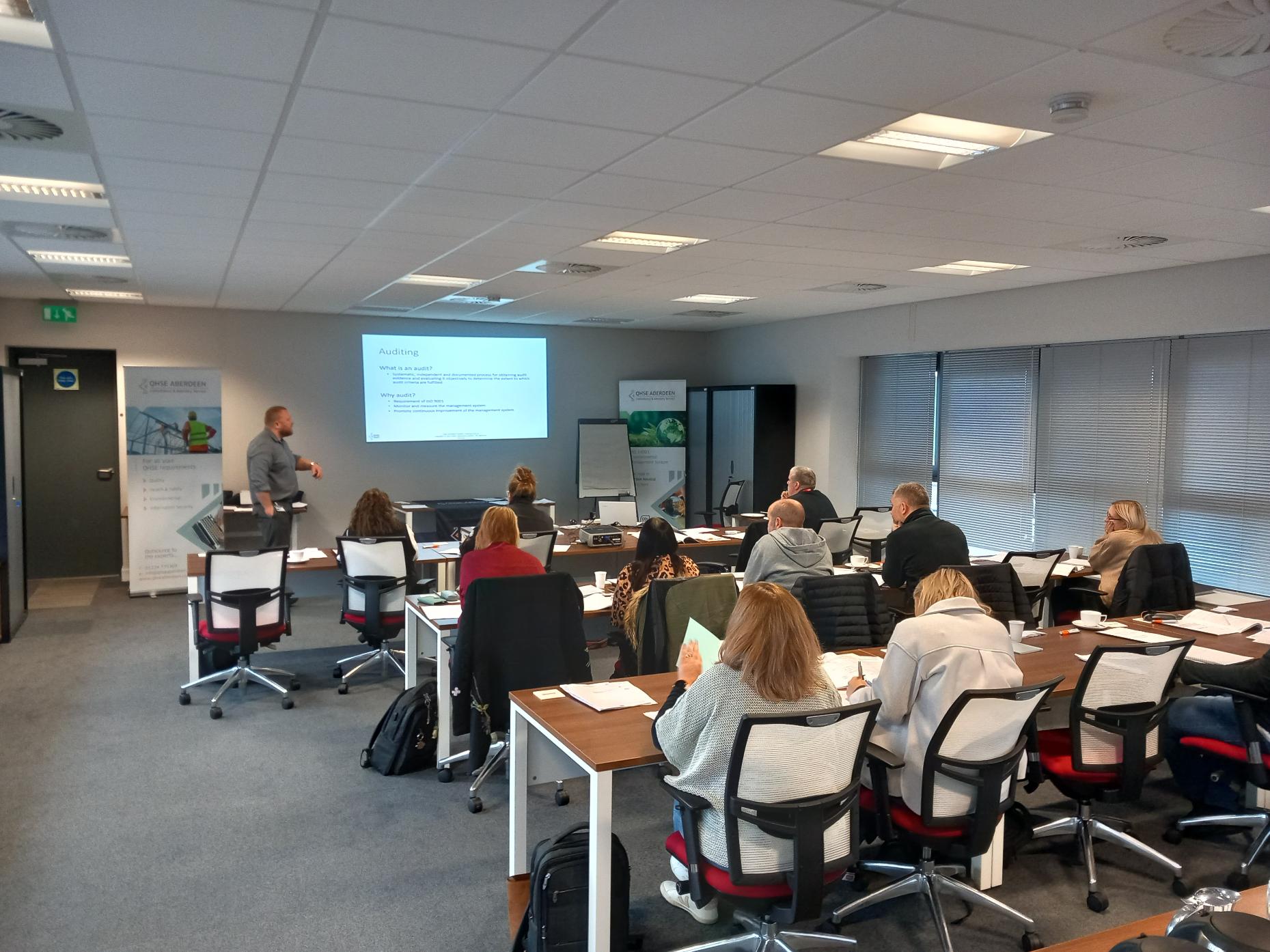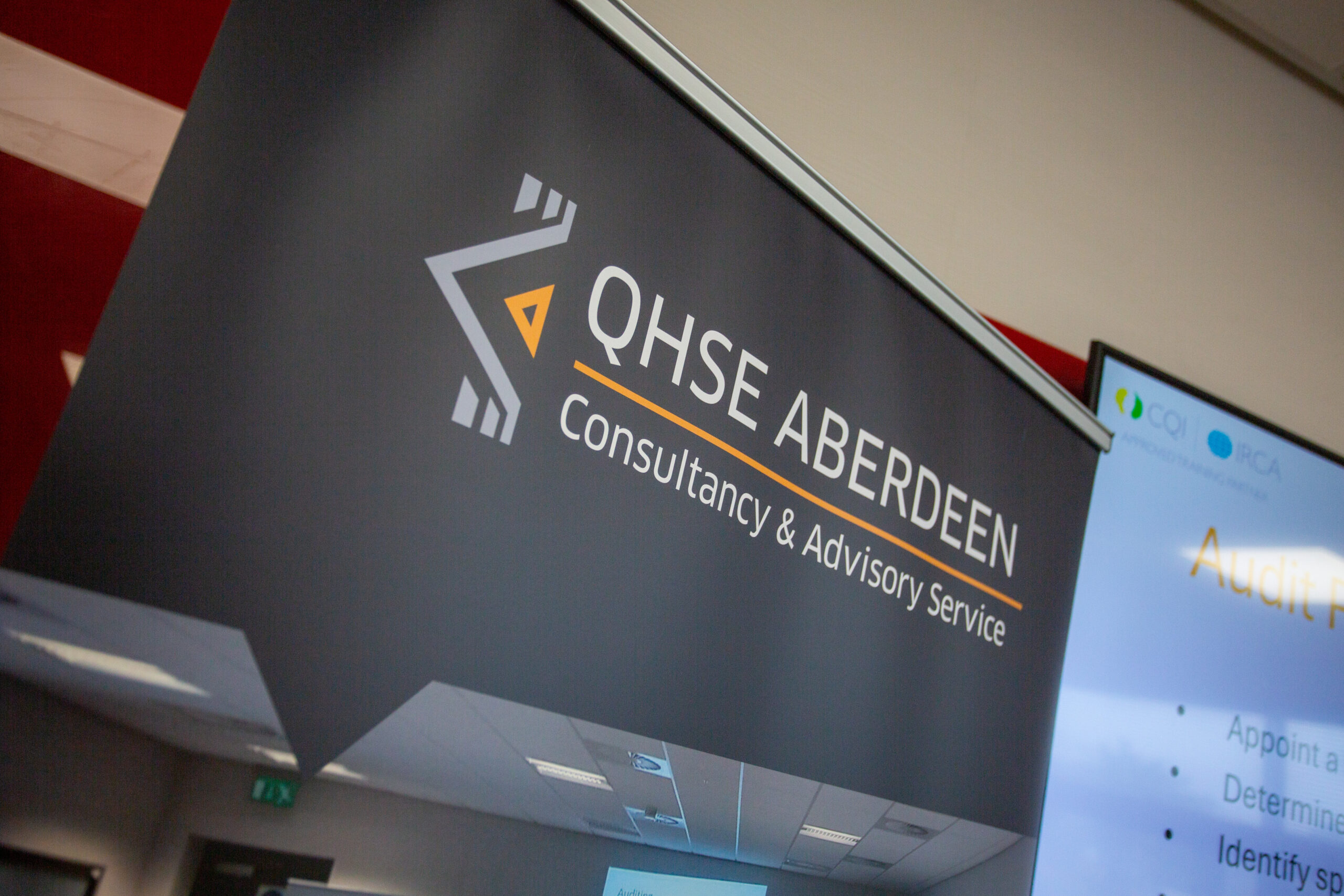Welcome to the July edition of the QHSE Aberdeen Newsletter! In the month that the Tall Ships race comes to Aberdeen and the sun has shone almost constantly. Our monthly series brings you updates from our team plus key QHSE industry insights.
Firstly, our own News…
We’re absolutely delighted to share that we are now officially CQI | The Chartered Quality Institute and IRCA | International Register of Certificated Auditors Approved to deliver the OHSMS ISO 45001:2018 Auditor Conversion (3-Day Course) 🎉 Another proud step in expanding our training services (as requested by our clients) and continuing to raise the bar. This is great for those who want to achieve a further Lead Auditor certificate in only 3 days!

That’s not all…. we also successfully passed our annual NQA Surveillance Audits for ISO 9001, ISO 14001, and ISO 45001, again. A huge team effort and testament to our commitment to quality, environment, and occupational health & safety standards

We want to introduce our new Team Member, Joanne Keilloh, she is an accomplished QHSE and Food Safety (HACCP) professional with over 24 years of experience across a diverse range of industries. Renowned for her proactive approach and practical problem-solving skills, Joanne excels in developing and implementing robust QHSE management systems that drive continuous improvement and ensure compliance.
She is passionate about leading QHSE initiatives and has a proven track record of fostering strong safety and quality cultures within organisations. Joanne is a Chartered Member of the Institution of Occupational Safety and Health (CMIOSH) and a Practitioner Member of the Chartered Quality Institute (CQI), reflecting her dedication to professional excellence and ongoing development.
Outside of work, Joanne enjoys competing in dressage with her horse, demonstrating the same discipline and passion in her personal pursuits as she does in her professional career.

Client News..
prosource.it have recertified to ISO 9001 Certification, well done to all involved in the process
Hydropulsion Ltd Just received their Certificate for ISO 9001/14001/45001another great achievement, well done !
TRAINING

QUESTION FROM CLIENT..
What’s the difference between ISO 27001 and the Cyber Essentials scheme?
“Cyber Essentials is a scheme run by IASME who deliver it for the National Cyber Security Centre. It provides a set of standard technical controls that companies and organisations must implement to gain certification. It tends to be a requirement to register as a qualifying supplier to public sector organisations. To obtain Cyber Essentials certification, you self-certify against this set of controls, and an independent assessor reviews your answers on behalf of IASME. If your answers are correct, you will achieve certification. For Cyber Essentials Plus, an assessor will audit your IT systems to verify that the controls are in place as stated in your Cyber Essentials questionnaire and conduct a basic penetration test that your network must pass to achieve certification. Cyber Essentials is a point-in-time assessment that only covers these technical controls. By contrast, certification to ISO 27001 requires an organisation to assess their security risks, implement and maintain controls for those risks, conduct audits and continually improve their information security management system. The control set for ISO 27001:2022 includes technological controls (like Cyber Essentials) but also organisational, people and physical controls to protect information. Implementing and maintaining a ISO 27001-compliant system is a bigger initiative, but gives an organisation more confidence that they have fully considered their risks and controls – it’s not just an IT project but something that will involve your whole business. Because the certification is ongoing, and your chosen certification body will conduct continuing assessment/surveillance visits, your customers and other stakeholders are assured that information security is an ongoing priority.
If you already have Cyber Essentials and are considering ISO 27001, you will find having those technical controls in place is a great baseline for building your technical control set for ISO 27001 compliance. If you already have ISO 27001 and you are considering Cyber Essentials, you are likely ready to certify, but the requirements are available on the IASME website – depending on how you have chosen to handle some technical controls like delivering operating system updates and definitions for other systems, you may need to manually bring everything up to the latest definitions to align exactly with the CE controls.”
Thank you Erin Brown for the reply.

Rising Interest in ISO 27001: What It Means for Us — and You
Over the past few months, we’ve seen a notable increase in enquiries regarding ISO 27001, the internationally recognised standard for Information Security Management Systems (ISMS). This rising interest signals a shift in client priorities, ……..data security is paramount, organisations are increasingly seeking partners who can demonstrate a structured, robust approach to safeguarding information.
Why ISO 27001 Matters
ISO 27001 goes beyond ticking compliance boxes — it represents a culture of accountability, continuous improvement, and proactive risk management. The certification demonstrates that an organisation not only understands the threats facing information systems but also implements stringent controls and monitoring to protect against them.
For clients, this means peace of mind. Working with a business certified to ISO 27001 reassures them that:
- Sensitive data is handled with integrity and confidentiality.
- Risks are identified and mitigated using a formal, repeatable process.
- There is a clear commitment to meeting legal, regulatory, and contractual requirements.
How Clients View ISO 27001-Certified Organisations
Clients increasingly view ISO 27001 as a trust signal, an assurance of operational maturity and forward-thinking governance. Holding this certification sets an organisation apart as diligent, secure, and professionally managed, which is particularly important in industries involving confidential data, high-value transactions, or regulatory oversight.
At QHSE Aberdeen, we’re encouraged by the demand and the recognition of the value ISO 27001 brings. As always, we remain committed to helping our clients navigate the path toward greater assurance, security, and business resilience.
When choosing suppliers, we at QHSE Aberdeen also prioritise working with ISO-certified organisations. These certifications reflect a clear commitment to quality, professionalism, and continuous improvement — values that foster confidence and build lasting trust.
After all, how can we expect others to believe in what we offer if we don’t hold ourselves to the same standard?
While information security is increasingly a top priority, especially with the growing interest in ISO 27001 it’s just one piece of the puzzle. Clients are seeking suppliers they can truly rely on, across multiple dimensions. Here are the key factors that influence their decision-making:
🔒 1. Certifications & Compliance
Holding recognised certifications like ISO 9001, 14001, 45001, and 27001 signals that a supplier takes quality, environment, health & safety, and information security seriously, and meets global standards.
📈 2. Proven Track Record
Clients want to see relevant experience, success stories, and the ability to deliver consistent results. A history of reliable performance builds trust.
🧪 3. Strong Quality Assurance
A robust internal quality system ensures that deliverables meet expectations, with low defect rates, root-cause analysis, and continuous improvement practices in place.
📞 4. Responsiveness & Communication
How a supplier communicates can make or break a partnership. Clients value clear, timely, and proactive engagement throughout the relationship.
🌍 5. Ethical and Cultural Alignment
Shared values matter. Many clients prioritise suppliers who align with their own corporate social responsibility (CSR) or ESG goals, including ethics, sustainability, and inclusivity.
💼 6. Financial Stability
Risk management is key. Clients look for financially sound suppliers who can deliver over the long term without disruption.
💡 7. Innovation & Flexibility
Can the supplier adapt to change, scale, or improve processes when needed? Agility and a willingness to collaborate are increasingly valued.
HSE fatal injury statistics
In the 2024 to 2025 period, 124 workers were killed in work-related incidents in Great Britain, down from 138 the previous year.
The most common causes of fatal injuries are falls from height, being struck by a moving object, and being trapped by something collapsing or overturning.
Read about the incidents that should never happen… https://press.hse.gov.uk/category/news/
That’s all for this issue of our QHSE Newsletter! We hope you found the information valuable and time well-spent. Remember, investing in QHSE best practices leads to improved performance, increased stakeholder confidence, and a safer work environment. Stay tuned for our next issue, packed with more useful tips and updates.
Feel free to reach out if you have any questions, suggestions, or topics you’d like us to cover. Until next time, stay safe, and keep up the great work!
If you want to feature in our Newsletter drop us a line with your QHSE Experiences.




